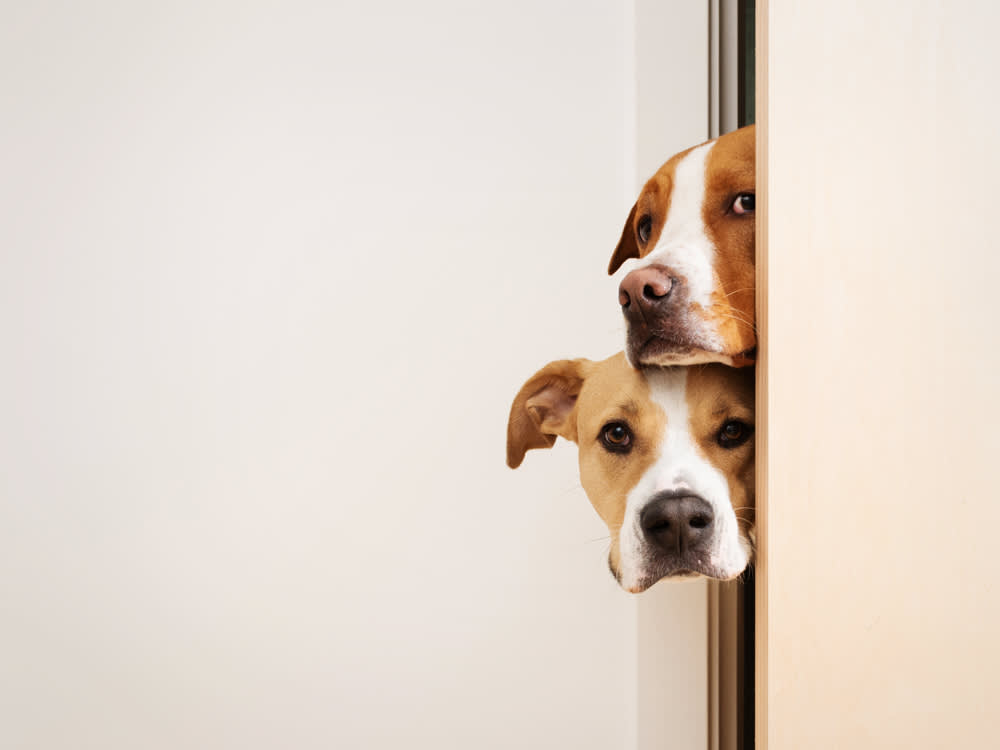by Kelly Villa, | August 1, 2024

Aleksey Boyko / Shutterstock
“Why is my dog acting scared all of a sudden?” It’s a natural question for a pet parent whose once secure puppy has suddenly become fearful of them to ask. While it makes sense to feel concerned (and maybe even offended) by this shift, it’s important to consider that your dog may be experiencing a normal developmental phase called a “fear period.”
What causes dogs to get scared suddenly?
One common reason young dogs and puppies get scared suddenly is something called “fear periods.” Fear periods are times during which young dogs are more likely to become scared by things that may not have previously bothered them.
The first fear period happens around the time puppies leave their litter at eight to eleven weeks old, at which point they are exposed to a new environment without the protection of their mother.
The secondary fear period in dogs generally happens when they’re between six and fourteen months.
These phases are associated with points in a puppy’s life when learning to be cautious helps keep them safe.
Some signs your dog is fearful include body language such as crouching, lying down and freezing, panting, yawning, putting their ears back, and tucking their tail.
These phases help teach young dogs how to be cautious and are just that: phases. So, if you suddenly find your dog cowering when they hear a loud car pass or running away from house guests, don’t panic. These fear periods generally last a few weeks and don’t have lasting effects of fearfulness.
Read this related article on Kinship

Puppy Fear Periods: Why is My Dog Scared All of a Sudden?
Turns out, adolescence isn’t just tough for humans—it can be hard on dogs, too.
How can I help my fearful dog?
There are many reasons a dog may be scared of you if they’re not in a developmental stage when it would be natural for them to experience a fear stage. Especially if the dog is new to your family, fear can be a normal part of their process of acclimating to their new environment. If they had negative experiences in past homes or shelters, they may carry that fear into your home. If your dog is not in a fear stage and has suddenly started reacting to you with fear, it’s also possible your dog had a scary experience that they’ve come to associate with you.
No matter the cause, once a dog is fearful of you, it’s important to work to build their trust in you. When your dog seems fearful, remain calm and talk in a relaxed, cheerful way to put your dog at ease. You can also try giving them something love, such as a treat, to develop positive associations with you.
If your dog remains fearful for longer than a few weeks, it’s a good sign they’re not experiencing a developmental phase and may need more help overcoming their fearfulness. In this case, it’s important to recognize these signs as soon as possible and consult a veterinarian to make sure there isn’t an underlying medical issue causing their fear. You may also want to talk to an animal behavior specialist for individual, tailored support in helping your dog overcome their fear.

Kelly Villa
Kelly Villa is a freelance writer and contributor to various pet publications.
Related articles

Behavior & Training
Will My Skittish Dog Always Be Skittish?

Behavior & Training
When Is a Dog’s Teenage Phase?

Behavior & Training
Why Is My Dog Suddenly Afraid to Go Outside?

Behavior & Training
Why Is My Dog Being Aggressive All Of A Sudden?

Behavior & Training
Why Is My Dog Suddenly Chewing Everything?

Behavior & Training